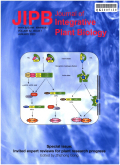- 钛学术文献服务平台 \
- 学术期刊 \
- 基础科学期刊 \
- 生物科学期刊 \
- 植物学报(英文版)期刊 \
null
Combined genome-wide association study and transcriptome analysis reveal candidate genes for resistance to Fusarium ear rot in maizeOO
基本信息来源于合作网站,原文需代理用户跳转至来源网站获取
摘要:
Fusarium ear rot, caused by Fusarium verti-cillioides, is a devastating fungal disease in maize that re-duces yield and quality; moreover, F. verticillioides pro-duces fumonisin mycotoxins, which pose serious threats to human and animal health. Here, we performed a genome-wide association study (GWAS) under three en-vironmental conditions and identified 34 single-nucleotide polymorphisms (SNPs) that were significantly associated with Fusarium ear rot resistance. With reference to the maize B73 genome, 69 genes that overlapped with or were adjacent to the significant SNPs were identified as potential resistance genes to Fusarium ear rot. Comparing transcriptomes of the most resistant and most susceptible lines during the very early response to Fusarium ear rot, we detected many differentially expressed genes enriched for pathways related to plant immune responses, such as plant hormone signal transduction, phenylpropanoid bio-synthesis, and cytochrome P450 metabolism. More than one-fourth of the potential resistance genes detected in the GWAS were differentially expressed in the tran-scriptome analysis, which allowed us to predict numbers of candidate genes for maize resistance to ear rot, in-cluding genes related to plant hormones, a MAP kinase, a PR5-like receptor kinase, and heat shock proteins. We propose that maize plants initiate early immune responses to Fusarium ear rot mainly by regulating the growth-defense balance and promoting biosynthesis of defense compounds.

推荐文章
期刊_丙丁烷TDLAS测量系统的吸收峰自动检测
带间级联激光器
调谐半导体激光吸收光谱
雾剂检漏 中红外吸收峰 洛伦兹光谱线型
不同盐度、温度及光照对漂浮浒苔生理生态的影响
浒苔
盐度
温度
光照
生理生态
期刊_联合空间信息的改进低秩稀疏矩阵分解的高光谱异常目标检测
高光谱图像
异常目标检测 低秩稀疏矩阵分解 稀疏矩阵 残差矩阵
内容分析
关键词云
关键词热度
相关文献总数
(/次)
(/年)
引文网络
引文网络
二级参考文献 (338)
共引文献 (110)
参考文献 (43)
节点文献
引证文献 (0)
同被引文献 (0)
二级引证文献 (0)
1970(1)
- 参考文献(0)
- 二级参考文献(1)
1971(2)
- 参考文献(0)
- 二级参考文献(2)
1972(1)
- 参考文献(0)
- 二级参考文献(1)
1973(1)
- 参考文献(0)
- 二级参考文献(1)
1976(1)
- 参考文献(0)
- 二级参考文献(1)
1977(1)
- 参考文献(0)
- 二级参考文献(1)
1978(1)
- 参考文献(0)
- 二级参考文献(1)
1980(2)
- 参考文献(0)
- 二级参考文献(2)
1981(1)
- 参考文献(0)
- 二级参考文献(1)
1982(4)
- 参考文献(0)
- 二级参考文献(4)
1983(1)
- 参考文献(0)
- 二级参考文献(1)
1984(3)
- 参考文献(0)
- 二级参考文献(3)
1986(2)
- 参考文献(0)
- 二级参考文献(2)
1987(1)
- 参考文献(0)
- 二级参考文献(1)
1988(2)
- 参考文献(0)
- 二级参考文献(2)
1989(2)
- 参考文献(0)
- 二级参考文献(2)
1990(4)
- 参考文献(0)
- 二级参考文献(4)
1991(6)
- 参考文献(0)
- 二级参考文献(6)
1992(5)
- 参考文献(1)
- 二级参考文献(4)
1993(11)
- 参考文献(1)
- 二级参考文献(10)
1994(7)
- 参考文献(1)
- 二级参考文献(6)
1995(13)
- 参考文献(1)
- 二级参考文献(12)
1996(7)
- 参考文献(0)
- 二级参考文献(7)
1997(9)
- 参考文献(0)
- 二级参考文献(9)
1998(6)
- 参考文献(0)
- 二级参考文献(6)
1999(18)
- 参考文献(1)
- 二级参考文献(17)
2000(14)
- 参考文献(0)
- 二级参考文献(14)
2001(9)
- 参考文献(1)
- 二级参考文献(8)
2002(18)
- 参考文献(2)
- 二级参考文献(16)
2003(16)
- 参考文献(3)
- 二级参考文献(13)
2004(16)
- 参考文献(2)
- 二级参考文献(14)
2005(16)
- 参考文献(0)
- 二级参考文献(16)
2006(11)
- 参考文献(1)
- 二级参考文献(10)
2007(24)
- 参考文献(2)
- 二级参考文献(22)
2008(24)
- 参考文献(3)
- 二级参考文献(21)
2009(20)
- 参考文献(2)
- 二级参考文献(18)
2010(13)
- 参考文献(2)
- 二级参考文献(11)
2011(29)
- 参考文献(4)
- 二级参考文献(25)
2012(17)
- 参考文献(1)
- 二级参考文献(16)
2013(21)
- 参考文献(5)
- 二级参考文献(16)
2014(11)
- 参考文献(3)
- 二级参考文献(8)
2015(6)
- 参考文献(3)
- 二级参考文献(3)
2016(3)
- 参考文献(3)
- 二级参考文献(0)
2017(1)
- 参考文献(1)
- 二级参考文献(0)
2020(0)
- 参考文献(0)
- 二级参考文献(0)
- 引证文献(0)
- 二级引证文献(0)
引文网络交叉学科
相关学者/机构
期刊影响力
植物学报(英文版)
主办单位:
中国植物学会
出版周期:
月刊
ISSN:
1672-9072
CN:
11-5067/Q
开本:
大16开
出版地:
北京香山南辛村20号中科院植物所内
邮发代号:
2-500
创刊时间:
1952
语种:
eng
出版文献量(篇)
3621
总下载数(次)
1
总被引数(次)
74646
期刊文献
相关文献
推荐文献
- 期刊分类
- 期刊(年)
- 期刊(期)
- 期刊推荐
力学
化学
地球物理学
地质学
基础科学综合
大学学报
天文学
天文学、地球科学
数学
气象学
海洋学
物理学
生物学
生物科学
自然地理学和测绘学
自然科学总论
自然科学理论与方法
资源科学
非线性科学与系统科学
植物学报(英文版)2022
植物学报(英文版)2021
植物学报(英文版)2020
植物学报(英文版)2019
植物学报(英文版)2018
植物学报(英文版)2017
植物学报(英文版)2016
植物学报(英文版)2015
植物学报(英文版)2014
植物学报(英文版)2013
植物学报(英文版)2012
植物学报(英文版)2011
植物学报(英文版)2010
植物学报(英文版)2009
植物学报(英文版)2008
植物学报(英文版)2007
植物学报(英文版)2006
植物学报(英文版)2005
植物学报(英文版)2004
植物学报(英文版)2003
植物学报(英文版)2002
植物学报(英文版)2001
植物学报(英文版)2000
植物学报(英文版)1999
植物学报(英文版)1998
植物学报(英文版)2020年第9期
植物学报(英文版)2020年第8期
植物学报(英文版)2020年第7期
植物学报(英文版)2020年第6期
植物学报(英文版)2020年第5期
植物学报(英文版)2020年第4期
植物学报(英文版)2020年第3期
植物学报(英文版)2020年第2期
植物学报(英文版)2020年第12期
植物学报(英文版)2020年第11期
植物学报(英文版)2020年第10期
植物学报(英文版)2020年第1期

 免费查重
免费查重










